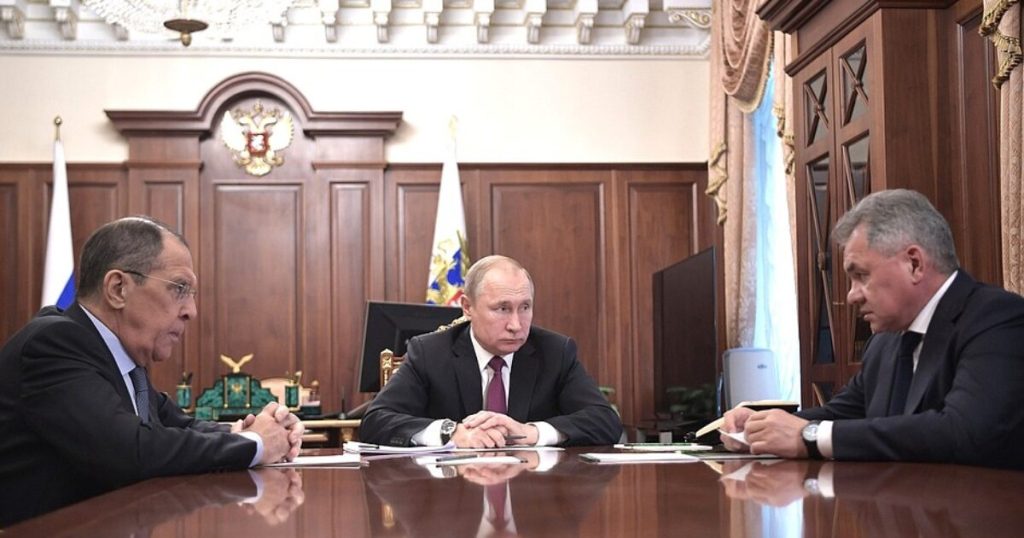President Vladimir Putin and Defense Minister Shoigu – Image courtesy of the President of Russia.
In what the Kremlin has labeled a warning to Western nations, Russian President Vladimir Putin has announced plans to lower the nuclear threshold, allowing for nuclear retaliation in response to large-scale air assaults and treating attacks by non-nuclear states, when supported by nuclear powers, as joint offensives.
Moscow aims to raise the stakes and discourage further support for Ukraine.
Meanwhile, both the Concept of the Foreign Policy of the Russian Federation and the Kremlin’s 2024 National Threat Assessment call for displacing the U.S. and the West as global leaders, with the fall of Ukraine viewed as a crucial step in reshaping the international order under Moscow and Beijing.
As the cost of supporting Ukraine rises, the cost of allowing its collapse may be even greater.
Russia’s Defense Ministry is set to gain the power to assess whether conditions for deploying nuclear weapons are met, as part of upcoming changes to the country’s nuclear doctrine, according to Kremlin spokesperson Dmitry Peskov.
The revisions are being made in response to increased involvement of nuclear powers in the war in Ukraine and NATO’s expanded presence near Russia.
President Vladimir Putin recently announced plans to expand Russia’s nuclear policy, allowing for nuclear responses to major air attacks and considering attacks by non-nuclear nations backed by nuclear powers as joint actions.
Peskov emphasized that these changes are a clear message to Western countries contemplating support for Ukrainian long-range missile strikes on Russian territory. The amendments will soon be formalized legally.
In a further statement, Peskov emphasized that the updated nuclear doctrine is intended as a direct warning to Western countries.
He noted that the changes signal potential consequences for nations participating in attacks on Russia, not necessarily with nuclear weapons, and stressed that the doctrine is being adjusted due to rising tensions near Russia’s borders.
While the changes do not involve increasing Russia’s nuclear arsenal, they come as Ukraine continues to seek approval from Western allies to use long-range precision weaponry to strike deep inside Russian territory, a move that has met with caution from the White House to prevent further escalation.
This reduction in the nuclear threshold comes amid ongoing debates in Russia over whether the country should consider a nuclear first strike. These discussions have reached the highest levels of leadership, including President Vladimir Putin.
The debate was sparked in June by Sergei Karaganov, honorary chairman of Russia’s Council on Foreign and Defense Policy, who referred to nuclear arms as “God’s Weapons” arguing that the West must be forced into retreat by threatening, or even launching, a nuclear strike.
However, this radical stance has been largely rejected by Russian experts, who contend that nuclear war is a poor strategy with potentially catastrophic consequences.
While figures such as former president Dmitry Medvedev and Chechen leader Ramzan Kadyrov have hinted at nuclear use, Karaganov’s advocacy for a first strike has gained little traction. Ultimately, the decision rests with Putin and his inner circle.
TASS, Russian News Agency, published an article by Igor Korotchenko, Editor-in-Chief of the National Defense Journal, outlining key updates to Russia’s nuclear doctrine.
According to Korotchenko, the revised policy allows Russia to engage nuclear weapons if NATO collectively or a single non-nuclear country takes military action against Russia.
For example, the deployment of Polish troops in Ukraine or Romanian and Polish efforts to down Russian aircraft would be viewed as aggression, justifying a nuclear response.
Additionally, any U.S. strike with air or seaborne cruise missiles would be considered a casus belli, leading to potential nuclear retaliation against the U.S.
Korotchenko emphasized that these changes represent a significant departure from previous doctrine, now identifying the U.S., UK, and France as nuclear adversaries if conventional military actions against Russia are detected.
The revised nuclear doctrine has also expanded the scope of Russia’s protective umbrella to include its allies. Russia Today (RT) reported, “Deep strikes by Ukraine and an attack on Belarus would now trigger an atomic response.”
The Kremlin offered a tongue-in-cheek explanation for revising the nuclear doctrine, with Deputy Foreign Minister Sergey Ryabkov criticizing the existing policy as “too general” and arguing that warning had to be made clearer.
Since May, Kiev has called on the U.S. and its allies to remove all restrictions on the use of their weapons against Russia, which Moscow sees as direct Western involvement.
While Putin reiterated that nuclear weapons remain a last resort to protect Russian sovereignty, he also recognized the rapidly changing military-political landscape and the new threats facing Russia and its allies.
A significant percentage of Americans are growing weary of funding the Ukraine war, with the looming threat of nuclear conflict fueling calls to end U.S. and NATO support for Ukraine.
Meanwhile, Russia’s ambition to reshape the global order, with Beijing and Moscow at the helm, is clear.
In his letter advocating for the use of nuclear weapons in the context of the Ukraine conflict, Sergei Karaganov, honorary chairman of Russia’s Council on Foreign and Defense Policy, wrote, “failure (of the West) is accompanied by rapid changes, unprecedented in history, in the global balance of power in favor of the Global Majority, with China and partly India acting as its economic drivers, and Russia chosen by history to be its military-strategic pillar.
This weakening infuriates not only the imperial-cosmopolitan elites (Biden and Co.), but also the imperial-national ones (Trump).”
By lowering the nuclear threshold, Putin aims to deter Western support for Ukraine.
While this might seem like a lifesaving move in the short term, it would also advance the Moscow-Beijing axis’s goal of displacing the U.S. and positioning themselves as leaders of a new international order. In the long run, allowing Ukraine to collapse could prove more costly for the West than continuing to fund its defense.
The post Russia Elevates Nuclear Threat: Implications for Ukraine and the Global Power Balance appeared first on The Gateway Pundit.





